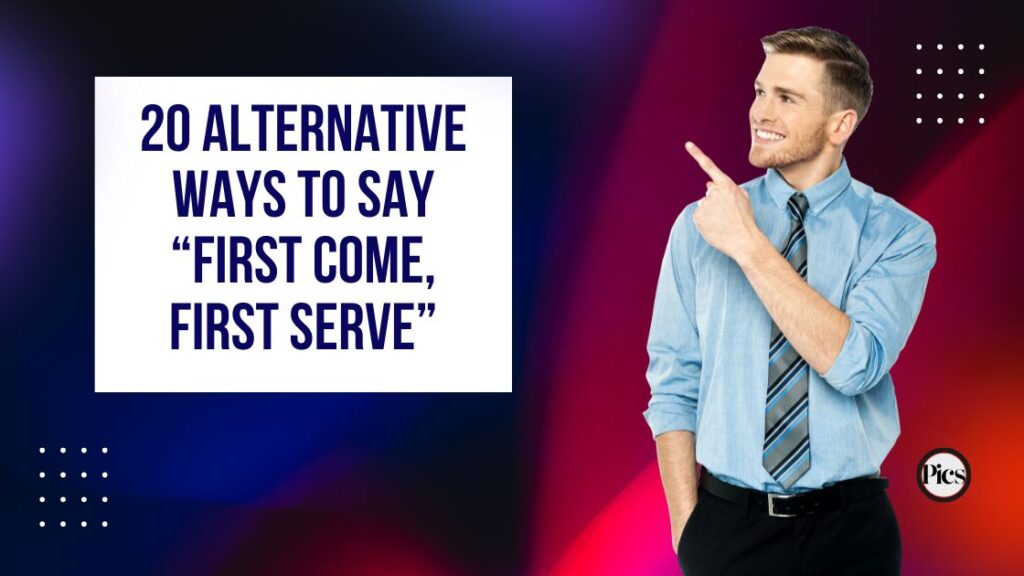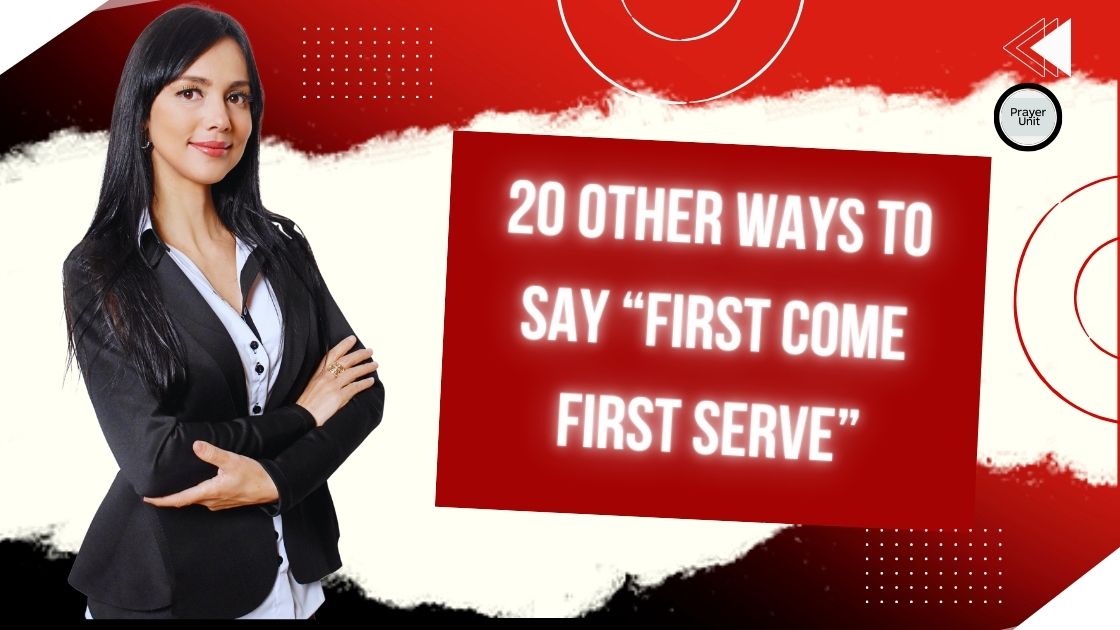Looking for 20 Other Ways to Say First Come First Serve You’re in the right place, This common phrase is widely used to explain how things are distributed based on who arrives or responds first. But sometimes, it’s nice to have a little variety in your language, especially if you want to sound fresh or professional. In this article, we’ll explore some creative alternatives that can bring a new twist to this well-known expression.
Whether you’re drafting a policy, sending an email, or making an announcement, having these alternatives at your disposal can help you keep things clear and engaging. From formal to casual, we’ve got you covered with 20 Other Ways to Say “First Come First Serve” that fit a wide range of situations. Ready to find the perfect phrase Let’s dive into these options,
Is “First Come, First Serve” Professionally Appropriate?

The phrase “First Come First Serve” is generally considered professionally appropriate, but it can sometimes come across as informal or outdated depending on the context. In professional settings, it’s important to choose language that aligns with the tone and expectations of your audience.
While the phrase is commonly used in customer service, event planning, and business processes, alternatives like “Priority based on arrival” or “First in line gets served” might sound more polished. Ultimately, the choice depends on the formality of the situation and how clearly the message communicates priority or service based on timing.
Also Read, “God Bless You” (With Examples)
20 Alternative Ways to Say “First Come, First Serve”

Now, let’s take a look at some fresh, creative ways to get the same idea across without relying on this go-to phrase.
- First to arrive, first to receive.
- Early bird gets the first benefit.
- Quick to claim, quick to receive.
- Arrive early, secure your place first.
- First to show, first to be served.
- Speedy arrival guarantees speedy service.
- Early access means early advantage, always.
- First to act, first to benefit.
- Quick movers get quick rewards, always.
- Arrive first, get your reward first.
- Be quick, get your spot first.
- First in line, first to win.
- Early arrival secures first place, always.
- Arrive fast, get served fast, guaranteed.
- Early birds always get the advantage.
- Quick response, first to be rewarded.
- First to show, first to claim it.
- Fast action, first service, guaranteed reward.
- Early start means early advantage, always.
- First to arrive, first to act.
1. “Early Bird Gets the Worm”
“Early Bird Gets the Worm” emphasizes the benefits of acting early. It suggests that those who take prompt action are more likely to succeed or gain an advantage in any situation.
Example: Promotional Email for a Workshop
Subject: Unlock Your Potential: Join Our Upcoming Workshop,
Hi [Name],
Are you ready to take your skills to the next level? We’re excited to invite you to our [Workshop Name] happening on [Date] at [Location/Online Platform].
In this hands-on workshop, you’ll learn valuable insights on [Topic/Skill Focus], with expert guidance and practical tips that you can apply right away. Whether you’re looking to enhance your professional skills or explore new areas, this workshop is designed for [Target Audience] like you,
Space is limited, so don’t wait, Register now to secure your spot and be part of this exciting opportunity.
Early bird bonus: Sign up by [Date] and enjoy a special discount of [Discount Amount],
We can’t wait to see you there and help you unlock your full potential,
Best regards,
[Your Name]
[Your Title/Company]
[Contact Information]
2. “First In, First Out”
This phrase, often shortened to FIFO, is commonly used in accounting and inventory management. But it can also apply to situations where the order people arrive determines who gets served or benefits first.
Example: Customer Support Auto-Reply
Subject: Thank You for Reaching Out,
Hi there,
Thanks for contacting us, We’ve received your message and our team is on it. We’re working hard to get back to you as quickly as possible, but please note that it may take a little time.
In the meantime, feel free to check out our [Help Center/FAQ] for answers to common questions.
We appreciate your patience and will respond to you shortly,
Best regards,
[Your Company Name]
[Customer Support Team]
3. “Priority Given to Early Arrivals”
This phrase provides a more formal way to express the benefit of arriving early, without relying on overused sayings.
Example: Concert Venue Announcement
Exciting News: Upcoming Concert at [Venue Name],
Hi [Name],
Get ready for an unforgettable night, We’re thrilled to announce that [Artist/Band Name] will be performing live at [Venue Name] on [Date].
Don’t miss out on this amazing opportunity to see your favorite artist up close and personal. The show promises to be filled with incredible music, great energy, and memories you’ll never forget,
Event Details:
- Date: [Date]
- Time: [Start Time]
- Location: [Venue Name], [Venue Address]
- Tickets: [Ticket Link or Purchase Information]
Make sure to grab your tickets early, as they’re expected to sell out fast. We can’t wait to see you there,
Best,
[Your Name]
[Venue Name]
4. “Served in Order of Arrival”

This simple phrase explains the process clearly without using common clichés. It’s great for situations where you need to be clear about how service will be given.
Example: Restaurant Waiting List Policy
Hi there,
Thank you for choosing to dine with us, To ensure a smooth and enjoyable experience for everyone, here’s a quick overview of our waiting list policy:
- First Come, First Served: We seat guests in the order they arrive.
- Estimated Wait Time: Once you’ve been added to the list, we’ll provide an estimated wait time. Please note that this may vary depending on current demand.
- Arriving Late: If you arrive more than 10 minutes after your name is called, we may offer your table to other guests.
- Reservations: We do not accept reservations for walk-in customers. However, feel free to call ahead for larger parties.
5. “First to Arrive, First to Benefit”
This phrase highlights the advantages of being early, adding a positive twist by emphasizing the benefits of prompt action. It encourages proactive behavior, making it about opportunity rather than just following an order of service.
Example: Limited-Time Offer Email
Subject: Don’t Miss Out, Limited-Time Offer Just for You,
Hi [Name],
We’ve got something special for you, For a limited time only, enjoy [Discount or Offer] on all our products/services.
Hurry – this offer ends on [Date], so make sure to grab it before it’s gone, Here’s how you can claim your deal:
- Visit our website: [Website Link]
- Add your favorite items to the cart.
- Use the promo code [Code] at checkout for your [Discount].
Take advantage of this exclusive offer while it lasts, Don’t wait too long once it’s gone, it’s gone,
Best regards,
[Your Name]
[Your Company Name]
[Contact Information]
6. “Queue Order Determines Service”

“Queue Order Determines Service” clearly communicates that the order in which individuals arrive or submit requests will determine when they are served. It’s a straightforward and efficient way to explain how service prioritization works.
Example: Amusement Park Ride Sign
Please Wait Your Turn – Line Forms Here
Thank you for your patience,
- Height Requirement: Must be at least [X] feet to ride.
- Safety Gear: Please secure all loose items before boarding.
- Ride Capacity: Limited to [X] riders per group.
We’ll get you on the ride as soon as it’s your turn. Enjoy the adventure,
7. “Chronological Processing of Requests”
“Chronological Processing of Requests” means that requests will be handled in the order they are received. This phrase emphasizes fairness and clarity, ensuring everyone understands that timing dictates the sequence in which requests are addressed.
Example: IT Department Service Request Policy
Dear Team,
To enhance efficiency and maintain fairness, we’ve updated our IT service request policy:
- Requests will be handled in the order received.
- For urgent issues, select “High Priority” and provide a brief explanation.
- Expected response times:
- Low Priority: 48-72 hours
- Medium Priority: 24-48 hours
- High Priority: 4-24 hours
Thank you for your understanding and support as we work to deliver timely assistance to everyone.
Best regards,
Jane Smith
Head of IT Department
8. “Prompt Action Reaps Rewards”

“Prompt Action Reaps Rewards” encourages quick responses by highlighting the benefits of acting fast. It emphasizes that those who act promptly will gain an advantage or be rewarded in the process.
Example: Limited Edition Product Launch
Subject: Don’t Wait – Limited Edition Now Available,
Hi [Name],
The wait is over, Our limited edition [Product Name] is here, but it won’t last long. Once it’s gone, it’s gone for good,
How to grab yours:
- Visit [Website Link].
- Add the [Product Name] to your cart.
- Check out before it’s too late,
Act fast to make sure you don’t miss out on this exclusive release. Supplies are limited, so get yours today,
Best,
[Your Name]
[Your Company Name]
9. “Time of Arrival Determines Priority”
“Time of Arrival Determines Priority” indicates that the order in which individuals arrive will determine their level of priority. It reinforces the idea that early arrivals will be given preference in receiving service or attention.
Example: Job Application Announcement
Subject: Now Hiring – Apply Today,
We’re excited to announce new job openings at [Company Name],
Applications will be reviewed in the order they are received, so don’t wait to submit yours. Here’s how to apply:
- Visit [Job Application Link].
- Select the position you’re interested in.
- Complete and submit your application.
Positions are filling quickly, so act fast to secure your chance to join our team. We can’t wait to hear from you,
Best regards,
[Your Name]
[Your Company Name]
10. “Swift Response Secures Advantage”
This phrase takes a positive approach, encouraging prompt action by focusing on the benefits of being early rather than just the order of service.
Example: Limited Scholarship Offer
Subject: Don’t Miss Out – Scholarships Available Now,
Dear Students,
We’re thrilled to offer a limited number of scholarships for [Program Name]. Scholarships will be awarded on a first-come, first-considered basis, so apply early to maximize your chances,
How to Apply:
- Complete your application at [Application Link].
- Submit all required documents by [Deadline].
- Watch for an email confirming your submission.
Don’t wait secure your opportunity to fund your education today,
Best regards,
[Your Name]
[Your Institution/Organization]
11. “Priority Based on Order of Receipt”
This phrase works well in formal business settings where clear and precise communication is essential.
Example: Grant Application Process
Subject: Grant Application Process – Apply Today,
Dear Applicants,
We’re excited to announce that the grant application process is now open. To ensure fairness and efficiency, all applications will be reviewed in the order they are received.
How to Apply:
- Visit [Application Link].
- Complete the online form with all necessary details.
- Submit your application before [Deadline].
Don’t wait, Submit your application early for the best chance of receiving funding. We look forward to reviewing your submissions.
Best regards,
[Your Name]
[Your Organization]
12. “First In The Queue, First In Review”
This phrase clearly explains how things will be processed, using queue terms that are common in many service situations.
Example: Manuscript Submission for Publishing
Subject: Manuscript Submission Guidelines
Dear Authors,
We are now accepting manuscript submissions for [Journal/Publisher Name]. To ensure fairness, all manuscripts will be reviewed in the order they are submitted.
How to Submit:
- Visit [Submission Link].
- Upload your manuscript along with all required documents.
- Submit your work by [Submission Deadline].
We encourage early submissions to ensure timely review. We look forward to reading your work,
Best regards,
[Your Name]
[Your Publisher/Journal Name]
13. “Advantage to Early Responders”
This phrase encourages quick action by focusing on the benefits of acting fast, without explicitly mentioning the order of service.
Example: Limited-Time Promotion for a Fitness App
Subject: Get Fit Now – Limited-Time Offer on Our Fitness App,
Hi [Name],
Don’t miss out on our exclusive limited-time promotion, Sign up for [App Name] today and enjoy a range of premium features designed to help you reach your fitness goals faster.
What you’ll get:
- Full access to all workout programs
- Personalized meal plans
- Progress tracking tools
The clock is ticking, so act quickly to unlock these benefits at a special rate. Offer ends [Date],
Stay fit,
[Your Name]
[Your Fitness App Name]
14. “Sequential Processing of Applications”
This formal phrase is perfect when you need to explain a clear, step-by-step process for handling requests or applications.
Example: University Admissions Policy
Subject: University Admissions Policy Update
Dear Prospective Students,
We’d like to inform you about our updated admissions policy for the upcoming academic year. To ensure fairness, all applications will be reviewed in the order they are submitted.
How to Apply:
- Visit [Application Link].
- Complete the application form with all necessary documents.
- Submit your application before [Deadline].
We encourage you to submit your application as early as possible to ensure timely consideration. We look forward to reviewing your application,
Best regards,
[Your Name]
[Your University Name]
15. “Early Engagement Earns Precedence”
“Early Engagement Earns Precedence” highlights that those who get involved early will be prioritized. It encourages prompt participation, suggesting that acting first leads to gaining an advantage or higher priority.
Example: Online Course Registration
Subject: Register Now – Limited Spots for Our Online Course,
Hi [Name],
Ready to take the next step in your learning journey? Our online course registration is now open, and early registration means you’ll secure your spot and gain access to exclusive course materials,
How to Register:
- Visit [Registration Link].
- Choose your course and complete the registration.
- Pay your fee to confirm your spot.
Don’t wait – spots are filling up fast, and we want you to be part of the class,
Best regards,
[Your Name]
[Your Course Name]
16. “Timely Submission Ensures Priority”
“Timely Submission Ensures Priority” stresses that submitting requests or tasks on time guarantees they’ll be handled first. It emphasizes the value of acting promptly to secure quicker service or attention.
Example: Conference Speaker Proposal
Subject: Submit Your Proposal for [Conference Name] Speakers
Dear Potential Speakers,
We are now accepting proposals for speakers at [Conference Name], and we encourage you to submit yours as soon as possible. Early submissions give you the best chance to secure your spot and ensure full consideration.
How to Submit:
- Visit [Proposal Submission Link].
- Complete the speaker proposal form.
- Submit your proposal by [Deadline].
We look forward to hearing from you and reviewing your ideas for this exciting event,
Best regards,
[Your Name]
[Your Conference Name]
17. “Swift Action Secures Placement”
“Swift Action Secures Placement” emphasizes that quick decisions or actions ensure a favorable position. It motivates people to act fast to secure their spot or advantage.
Example: Limited Internship Opportunity
Subject: Apply Now – Limited Internship Opportunity,
Dear [Name],
We’re excited to announce a limited internship opportunity at [Company Name], Early applicants will have the best chance of securing their spot in this highly competitive program.
How to Apply:
- Visit [Application Link].
- Complete the application form and upload your resume.
- Submit your application by [Deadline].
Don’t wait – apply today and take the next step in your career,
Best regards,
[Your Name]
[Your Company Name]
18. “Prompt Responses Receive Precedence”
“Prompt Responses Receive Precedence” highlights that quick replies will be prioritized. It encourages swift action, signaling that those who respond faster will be given preferential treatment or quicker service.
Example: Limited-Time Customer Survey
Subject: Share Your Feedback – Limited-Time Customer Survey,
Dear [Customer Name],
We value your opinion. Take a few minutes to complete our limited-time customer survey and help us improve your experience with [Company Name]. Your feedback will be prioritized and is crucial to us as we continue to improve.
How to Participate:
- Click on [Survey Link].
- Complete the survey (it’ll only take [X] minutes).
- Submit your responses by [Deadline].
We appreciate your input and look forward to hearing from you,
Best regards,
[Your Name]
[Your Company Name]
19. “Early Birds Catch the Best Deals”
This phrase uses the familiar “early bird” saying to encourage quick action, making it especially effective in retail or promotional situations.
Example: Holidays by flydubai Promotion
Subject: Book Your Dream Holiday – Special Offers by flydubai,
Dear [Customer Name],
Looking to escape to a beautiful destination? Our limited-time holiday promotion by flydubai gives you the chance to book your dream getaway at unbeatable prices, The earlier you book, the better the deals.
How to Book:
- Visit [Promotion Link].
- Select your destination and preferred dates.
- Complete your booking before [Deadline].
Don’t miss out on these exclusive offers – book today and make your holiday dreams come true,
Best regards,
[Your Name]
[Your Company Name]
20. “Immediate Action Yields Best Results”
This phrase encourages quick responses by highlighting the benefits of acting promptly, without focusing on the order of service.
Example: Limited-Time Investment Opportunity
Subject: Don’t Miss Out – Limited-Time Investment Opportunity,
Dear [Name],
We’re excited to present a limited-time investment opportunity that could help you grow your wealth. Acting quickly ensures you don’t miss out on this unique chance to maximize your returns.
How to Invest:
- Visit [Investment Link].
- Review the details of the opportunity.
- Make your investment before [Deadline].
Take action now and secure your place in this exclusive offer,
Best regards,
[Your Name]
[Your Company Name]
FAQ’s
What are some alternative phrases to “First Come First Serve”?
You can use phrases like “Priority for early arrivals,” “First in line gets served,” or “First to act, first to benefit” to convey a similar message.
When should I use these alternatives?
These alternatives are perfect for situations where you need to explain priority based on timing, such as in policies, announcements, or customer service.
Are these alternatives formal or informal?
Some alternatives are formal, like “Priority based on arrival,” while others are more casual, like “Early bird gets the worm.”
Can these alternatives work in business communications?
Yes, these phrases work well in both business and casual settings, especially when you want to vary your language and keep things clear.
Why should I avoid overusing “First Come First Serve”?
Using different expressions helps keep your communication fresh and engaging, avoiding repetition and sounding more professional.
Conclusion
Knowing other ways to say first come first serve can be incredibly useful in various situations. Whether you’re drafting a policy, writing an email, or making an announcement, having alternatives at your disposal adds versatility to your communication. These expressions help keep your messages fresh and can better suit the tone of your audience.
By exploring other ways to say “first come first serve”, you can convey the same idea without relying on the same old phrase. From professional settings to casual interactions, these alternatives allow you to communicate priority and fairness clearly and effectively. So, the next time you need to express this concept, consider using one of these creative alternatives to make your point more engaging.

PicsPhrase, brings you the freshest and most creative caption ideas and bio inspirations to elevate your social media game. Explore trendy, witty, and relatable captions that resonate with every mood and moment. Stay updated with our regularly curated content and make your posts stand out effortlessly!

